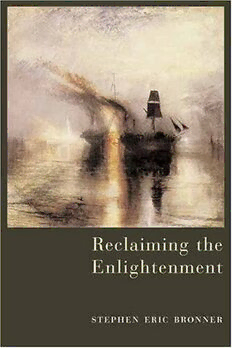
Reclaiming the Enlightenment: Toward a Politics of Radical Engagement PDF
201 Pages·2004·1.058 MB·English
Most books are stored in the elastic cloud where traffic is expensive. For this reason, we have a limit on daily download.
Preview Reclaiming the Enlightenment: Toward a Politics of Radical Engagement
Description:
This book tackles an obvious yet profound problem of modern political life: the disorientation of intellectuals and activists on the left. As the study of political history and theory has been usurped by cultural criticism, a confusion over the origins and objectives of progressive politics has been the result. Specifically, it has become fashionable for intellectuals to attack the Enlightenment for its imperialism, eurocentrism, and scientism, and for the sexism and racism of some of its major representatives. Although the fact that individual thinkers harbored such prejudices is irrefutable, Stephen Bronner argues that reducing the Enlightenment ethos to these beliefs is wholly unsustainable.With its championing of democracy, equality, cosmopolitanism, and reason -- and its vociferous attacks on popular prejudice, religious superstition, and arbitrary abuses of power -- the Enlightenment was once hailed as the foundation of all modern, progressive politics. But in 1947, this perspective was dramatically undermined when Max Horkheimer and Theodor Adorno published their classic work, Dialectic of Enlightenment, which claims that the Enlightenment was the source of totalitarianism and the worst excesses of modernity. Reclaiming the Enlightenment from purely philosophical and cultural interpretations, Bronner shows that its notion of political engagement keeps democracy fresh and alive by providing a practical foundation for fostering institutional accountability, opposing infringements on individual rights, instilling an enduring commitment to social reform, and building a cosmopolitan sensibility. This forceful and timely reinterpretation of the Enlightenment and its powerful influence on contemporary political life is a resounding wake-up call to critics on both the left and the right.
See more
The list of books you might like
Most books are stored in the elastic cloud where traffic is expensive. For this reason, we have a limit on daily download.
